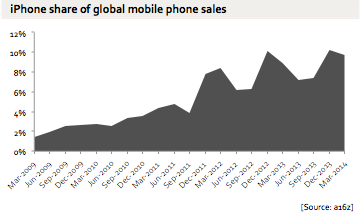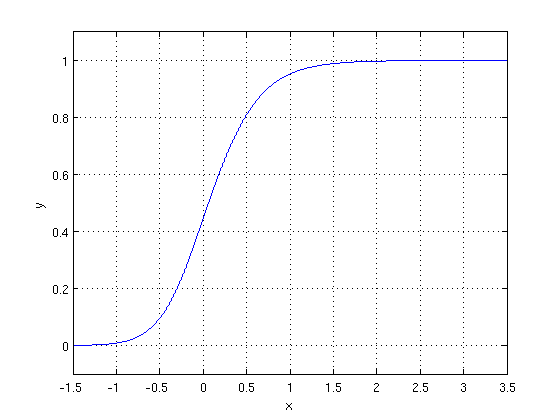“Whither” means “to what place or state: whither are we bound?” Wither means “dry up; wilt, droop, go limp, fade, perish; shrink, waste away, atrophy.” Following Apple’s World Wide Developer Conference (WWDC), we now know “whither” Apple is headed. Their base is strong and they seek to expand it by stealing share from Android and up-selling the Mac. Is that enough to make Apple’s base grow? Or is it a strategy that all but guarantees Apple’s base will stagnate and wither?
Base
Apple’s base is incredibly deep and strong.
IOS
Over 100 million iPods;
Over 500 million iPhones; and
Over 200 million iPads.
Over 800 million iOS devices sold overall.
Over 230 million iOS devices sold in the past 12 months, alone.
Over 130 million of those 230 million iOS devices went to new users. That’s a lot of new users and that’s the polar opposite of “stagnation.”
89% of iOS users are running Apple’s latest iOS 7 operating system. By way of contrast, only 9% of Android users are on Android’s latest operating system, Kit-Kat.
OS X
Over 80 million Macs sold. Note that 80 million Macs is only a tenth of the 800 million iOS units that have been sold.
Over 40 million of those 80 million Mac users are running the latest Mavericks operating system. That’s a 51% adoption rate, the fastest PC adoption rate in history. By way of comparison, after two years, Windows 8 adoption is at 14%.
While overall PC sales have declined by 5% over the past year, Mac sales have actually increased by 12%. Again, this growth is important for our later analysis, so please make a mental note of it.
iOS and OS X
iOS and OS X users combined are rapidly approaching one billion users.

Apple will easily reach the milestone of 1 billion iOS devices sold this year. ~ Horace Dediu (@asymco)
Developers
Over 9 million registered developers, up 47% since 2013. Let me repeat that. Apple’s registered developers have increased by an astonishing FORTY-SEVEN PERCENT in the last year alone. Again, this is the very opposite of stagnation.
Summary
Everyone keep in mind that Apple Is Doomed ~ Alex Wilhelm (@alex)
Undoubtably, Apple is doing better than well today. However, that still leaves unanswered the question of tomorrow. Where will Apple’s future growth come from?

Whither growth?
 Apple has a lock on the premium MP3 ((The MP3 Market is fading fast.)), Smartphone, Tablet and PC ((Desktops and Notebooks)) markets. Apple’s grip on these market is very stable and not being seriously challenged. However, growth, not stability, is what one strives for. How then is Apple going to grow?
Apple has a lock on the premium MP3 ((The MP3 Market is fading fast.)), Smartphone, Tablet and PC ((Desktops and Notebooks)) markets. Apple’s grip on these market is very stable and not being seriously challenged. However, growth, not stability, is what one strives for. How then is Apple going to grow?
In his excellent analysis, “GROWING APPLE AT WWDC“, Ben Thompson of Stretechery breaks down the only two ways Apple can grow — either by stealing share from others or by up-selling to their existing client base. Today we’ll examine how Apple is trying to steal share from Android. Tomorrow, in my Insider article (subscription required), I’ll take long look at how Apple is trying to up-sell the Mac.
Stealing Share From Others
There are three ways for Apple to steal share from Android. The first is to expand sales into areas where only Android is for sale. That means expanding its base of carriers. Apple is doing that, so I won’t dwell on it here. The second way is marketing and the third way is to reduce barriers to entry — to eliminate “deal breakers” that might prevent Android users from switching to Apple devices.
Marketing
Half the money I spend on advertising is wasted, and the trouble is I don’t know which half. ~ Lord Leverhulme
During the World Wide Developer Conference (WWDC), Apple went out of their way to trash Android. This was not an accident. If Apple wants potential customers to switch from Android to Apple then Apple has to highlight where Android’s problems lie and how Apples products serve as the solution to those problems.
— Apple pointed out that Android users were often unable to upgrade to the latest operating system and over one third of Android users were still using an operating system four or more years old. These users are not getting great new features, not running the latest apps and not getting security updates (and it shows.)
— Apple highlighted their own spectacular (97%) customer satisfaction ratings.
— Apple harped on the many privacy concerns that surround Android and Google products.
— Apple hammered Android on their lack of security, and in so doing, added the term “toxic hellstew” to the computing lexicon.
Renee Richie, has written an excellent article wherein he notes that Apple wants to be seen as number one where it matters most: engagement, affluence and value. This is not a new message. Apple has hammered home this theme over and over again.
We are unique position of having world class hardware, software and service skills under one roof, which enables us to provide an unparalleled user experience to hundreds and millions of customers. Working with our vibrant developer community we have built a large and thriving ecosystem. We are winning with our products in all the ways that are most important to us, in customer satisfaction, in product usage and in customer loyalty. ~ Tim Cook
Removing Barriers
With iOS 8, Apple battles Android on its own turf, allowing its users more choice. ~ Gigaom (@gigaom)
In addition to marketing Android’s weaknesses and iOS’ corresponding strengths, Apple can steal share from Android by making it easier for Android users to switch. One way to do this is to remove barriers; to eliminate “deal breakers”; to annex popular, but unique to Android, features and make them their own. Apple did this, with a vengeance, at WWDC 2014. A few examples:
- Notifications
- Widgets
- Messaging
- Quicktype
- Third-Party Keyboards
- Exstensibility
Looks like the big news at WWDC is iOS becoming a power-user operating system. ~ Harry McCracken (@harrymccracken)
Tim Cook and Craig Federighi’s Apple?
Apple’s efforts to add geeky Android features to their own products may just be a market response — an attempt by Apple to attract more Android users. However, I think it may also be an area where the current management of Tim Cook and Craig Federighi diverge from their predecessors, Steve Jobs and Scott Forstall. Steve Jobs was a purist and I’m guessing he wouldn’t have wanted to use scarce resources to create features that he didn’t think were important to mainstream users. And make no mistake about it — because this mistake IS being made all across the Technosphere — many of the features Apple added on Monday are totally unnecessary to mainstream users.
One of the unique aspects of Apple has been its willingness to embrace counter-intuitive realities. For example, Apple alone seems to understand that the more you limit what a computer can do, the more likely it is that it can reliably do the things it can do. Another example is choice. Apple knows that simplifying a product has nothing to do with eliminating features and everything to do with eliminating the burden of decision making from its users.
[pullquote]The features we clamor for most are the features that normals use least[/pullquote]
This is, of course, heresy to the Technoratti. We live in our own little geeky bubble and don’t realize that the features we clamor for most are the features that normals use least. Being un-empathetic is a human condition, but neckbeards like us have raised obliviousness to an art form.
Apple is doing the things we told ourselves they’d never do in their stubbornness. ~ Gabriel Visser (@gvssr)
Hmm. Stubborn, ey?
When a person stands their ground and we agree with them, they are principled. When a person stands their ground and we disagree with them, they are stubborn. It’s all a matter of perspective and if there’s one thing the tech crowd is lacking, it’s perspective.
All we know is that the power features we so dearly love are essential TO US. Therefore, we assume these features must be essential TO EVERYONE. As Apple has demonstrated over and over and over again — it just ain’t so. Normals buy Apple products, not despite the geek features they lack, but BECAUSE they don’t have to deal with all that geekery.
Steve Jobs was a fanatic and we loved him or hated him for it. Tim Cook strikes me as a more practical sort of man. I’m told Craig Federighi is a bit more geeky than Scott Forstall was. It should, therefore, have come as no surprise to us that Apple was bending a little and becoming a little bit more Android-like.
It should have come as no surprise — but it still did.
Whither Apple or Wither Apple?
So, is this a good thing or a bad thing for Apple?
In the short run, it is great for public relations. The pundits and the techheads and the acolytes of “open” are eating this up. Google the words “Apple” and “WWDC” and “open” and you’ll find a dozen or so articles praising the “new” more “open” Apple.
My 2¢: for the past few years it’s felt like Apple’s only goal was to put us in our place. Now it feels like they might want to be friends. ~ Cabel Sasser (@cabel)
You know who needs a friend, Cabel? End users, that’s who. Because when developers become more important than end users you get — Microsoft.
Putting developers “in their place” — which is, to say, placed behind end users — is exactly what Apple should be doing.
So in the short-run, developers and geeks are loving the new friendlier, more open Apple. But how is that going to play in long run? Will the “new” Apple be a better Apple; a more successful Apple? Or has Apple begun to lose their way, betraying the very core of their being?
The Argument Against
There are a couple of very good arguments against Apple’s new approach. And, ironically, they come from no less a source than Tim Cook himself:
We believe in the simple, not the complex. ~ Tim Cook, Acting Apple CEO, January 2009 FQ1 2009 Earnings Call
We believe in saying no to thousands of projects so that we can really focus on the few that are truly important and meaningful to us. ~ Tim Cook, Acting Apple CEO, January 2009 FQ1 2009 Earnings Call
We don’t believe we can do things at the level of quality and link things as we want to between hardware, software and services so seamlessly if we do a lot of stuff. So we’re going to stick with our knitting with only doing a few things and doing them great. ~ Tim Cook
The Argument For
On the other hand, there’s this:
It’s not about pop culture, and it’s not about fooling people, and it’s not about convincing people that they want something they don’t. We figure out what we want. And I think we’re pretty good at having the right discipline to think through whether a lot of other people are going to want it, too. ~ Steve Jobs
Can we make a product that we all want? We think we’re reasonable proxies for others. So those are things we’d ask about any new product category. ~ Tim Cook
The Verdict?
Steve Jobs, Scott Forstall, Tim Cook and Craig Federighi all believed or believe that they were or are “reasonable proxies” for others. The proxies have changed. The products will too.
The technology isn’t the hard part. The hard part is, what’s the product? Or, who’s the customer? ~ Steve Jobs
As Steve Jobs said, the hard part is knowing who your customer is. So long as Tim Cook and Craig Federighi keep the customer in mind, no one will much mind if they make Apple just a tiny bit geekier.
Tomorrow
Tomorrow, in my Insider’s article (subscription required), I will take a hard look at the second part of Apple’s growth strategy: up-selling the Mac. It’s very counter-intuitive to seek growth in a shrinking market and one has to question how much of an impact this strategy can have. However, without question, up-selling the Mac is completely aligned with Apple’s business model and it may have much more upside that one would initially think.
UPDATE: The follow-up article, entitled: “Up-Selling The Mac” is now available, here. Subscription required.


